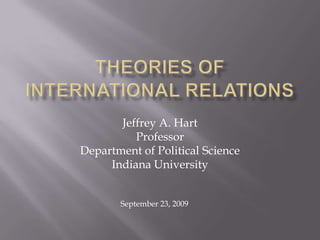This document provides an overview of various theories of international relations from classical authors like Thucydides and Macchiavelli to modern theories like realism, idealism, and integration/interdependence. It discusses key thinkers and works in each era from the rise of the nation-state system to modern debates around polarity, regimes, political economy, and constructivism. The document concludes by noting the field has evolved in a more faddish way compared to other disciplines, with an increasing gap between scholars focused only on military issues versus a broader range of phenomena.
















